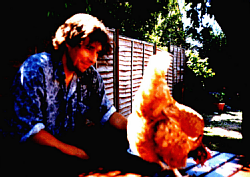

A Zine is a Zine ya say? I Give ye hardened rock journalism readers the Ptolemaic Terrascope for your consideration. Not to say this is the only worthy Zine out there but I think you can say that it is the most far reaching printed Zine in terms of revitalizing ones faith in rock journalism and in inspiring many other Zines.
Behind the PT is a sense of a greater amorphous rock community that cuts beyond borders and across time. Ya dig the funky stuff from New Zealand, ya groove to the 60's Psychedelia of San Francisco, ya dig the Krautrock, you name it and it's here because to the PT it is all one grand continuum and that attitude is what I believe makes the PT so generous, human, and hopeful. In a world where it's so easy (‘self not excluded) to play aesthetic god or music fashion consultant, editor Phil McMullen has shown us (and corrected us) as to how one should approach music journalism: with just curiosity and a love for the art form.
But enough of my piddly explanation....Phil McMullen kindly took time out from his busy schedule to speak with us and he can explain himself much better than a knave such as myself.
WG: Well, Phil, how'd the whole sordid affair start?
PMcM: The Ptolemaic Terrascope was started in 1989, basically as a reaction to the fact that there were no other magazines being regularly produced which we wanted to read - everything else seemed to be either thinly disguised mail-order lists for record labels, had the wrong attitude, were poorly produced or only concentrated on one type of music. I was tired of reading fanzines that only ever concentrated on one style of music or even just one band. What really bugged me was that all the other magazines ignored such huge areas of music. Also, that fanzines tended to have this idea that you can't write about old acts. That if you interview someone who was in Mighty Baby in 1972 it's no longer valid to the current music scene, although of course that's totally untrue. Musical styles get handed down and revitalised all the time, as the recent disinterment of Krautrock has shown. If you look at the average Terrascope reader's record collection, it's not only full of records made in 1998. They're going to have a collection that spans their record-buying life; it might have started in 1968, 1978 or 1988. Actually, probably not 1978 come to think of it. I don't recall that being a particularly vintage year... Television's 'Adventure' was about the high point, wasn't it?

|
|---|
Phil McMullen |
But anyway, our dream was to have a magazine that could cover everything. Obviously these days there's other, vastly more successful, magazines doing exactly the same thing - you only have to look at the cover of an issue of 'Mojo' to understand exactly where they got their ideas from. At the time though there simply wasn't anyone else around who was willing to cover a lot of ground. We wanted to write about anything that we were interested in, be it rock, pop, psychedelic, folk, blues, indie, new music or old music, and we wanted to produce a limited-edition, hopefully high quality magazine that contained the best writing and the best artwork we could achieve on a limited budget. Actually, it was on no budget at all. We stuck a few hundred flyers into the sleeve of a Woronzow Records compilation album announcing the magazine and inviting potential readers to send us money, which they did, bless their hearts. Enough to print 500 copies, anyway, which is all we did of the very first issue. It sold out within a matter of days.

|
|---|
Heather McMullen |
We very quickly discovered that we were producing a magazine quite unlike anything else and which people genuinely wanted to read; to this day, no matter how many copies of each issue we print, we still sell out completely almost immediately. The Terrascope is therefore notoriously hard to find, and has in itself become something of a collector's item - I recently auctioned off my own collection of Terrascopes to raise funds to keep the magazine afloat: 12 consecutive early copies raised $600. I often wish I had a secret hoard of back-issues stashed away for a rainy day, but unfortunately I don't. I simply didn't have the foresight to see it would become as successful as it has.
WG: Why do you think people sent you their money in the first place?
PMcM: Maybe because they knew our names already, and hopefully thought that whatever us three were up to was definitely worth a gamble. The three of us were: Nick 'Bevis Frond' Saloman of the aforementioned Woronzow Records; a friend of his (also the sleeve artist of the first few Woronzow Records releases) R.M. 'Cyke' Bancroft, who Nick had met while working at the offices of the Greater London Council (there's a Bevis Frond song which describes how he once saw Randy California and Ed Cassidy of Spirit walking down a corridor... that was at the GLC around the same time, they were involved in an anti-nuclear gig the council leader Ken Livingstone put on) - oh yeah, and myself living down here in Wiltshire, about 100 miles SW of London. At the time I was writing for various magazines both here and the USA, probably most notable of which was 'Bucketfull of Brains'.
Nick and I had met at a record fair in Bath sometime in the mid 1980s. I can't remember exactly how, when or why it was, but we instantly hit it off (an English expression meaning we got on well together, just in case it has another meaning over there...) and in the course of the next few months I encouraged Nick to put down some of his bedroom recordings for posterity onto vinyl, helping things along with an article on the man, the mystery and his miasmic genius in the Bucketfull.
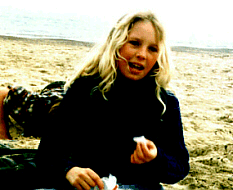
|
|---|
Emily Grace McMullen |
WG: What were your dreams for the magazine when you were putting it together?
PMcM: I saw it as a kind of release - I was tired of editors taking the stuff I'd written and putting their own spelling misstaks in, and I just knew I could do a better job myself. I knew I could write and I knew I could edit other people's articles, but what I couldn't do was actually put a magazine together or create genuinely good artwork - and that's where Saloman and Bancroft came in. They both had that kind of experience. The whole Bevis Frond thing took off faster than any of us suspected, and when one day Nick and I were talking with Bancroft, who did the artwork for that debut Bevis Frond album sleeve, we suddenly discovered that the three of us had the right skills to do a magazine of our own. Nick had worked in publishing and already had an audience who would want to see or hear anything by him, Bancroft of course was a genius artist with a really quite unique style, and I could write a bit, so we figured we couldn't lose.
My main problem was a lack of confidence: I was totally in awe of writers like Nigel Cross, John Tobler, Colin Hill, Pete Frame, Fred Mills, Byron Coley and Jud Cost - and I never dreamed I'd be able to produce a magazine that was as good as Zig Zag, Creem [ed. -Boy Howdy!] or any of the other magazines that I thought of as classics when I was younger. Nick had to literally pick me up and shake me to convince me that I could do it. I still don't really believe him, but one of my proudest achievements is the fact that I have had a lot of those people write for me in the Terrascope over the past few years. A lot of people actually compare us in style, although not in layout, to Zig Zag, the father of all British fanzines. I started thinking that maybe they had a point when Pete Frame, the original editor of Zig Zag and now renowned for his Rock Family Trees, wrote in saying how much he enjoyed the Terrascope - and how much it reminded him of Zig Zag's heyday.... it certainly wasn't a conscious thing though. Actually, if anything I was inspired by a long-forgotten English fanzine called Dark Star, which lasted for 26 issues during the 70s. I always swore I'd do at least 27 Terrascopes, just to go one better than Dark Star.

|
|---|
Tom McMullen |
I suppose I really wanted the magazine to be seen as a home for good writing as well as good music - I knew the artwork was and is brilliant, and it's a constant struggle to keep the writing up to a similar standard. Since the early days Cyke Bancroft has fallen by the wayside, but we were lucky enough to find a replacement artist in Davina Ware, who has maintained the original distinctive style of the magazine whilst adding some wonderful new ideas of her own. You can actually see where things started to go wrong, around issue 17 or so when Bancroft wasn't producing any new work and Nick and I were recycling old stuff of his - then suddenly issue 19 appeared which has this whole wonderful new feel about it. That's where Davina stepped in, and it's been getting better and better ever since to my mind. So there's still principally three of us involved, and we each play our part. I write/edit the magazine and run the subscriptions and stuff, Davina does all the layout, paste-up and artwork by hand, and Nick hustles sales, gets it printed and masters and cuts the free 7" EP. Oh yeah, and these days we also have a web editor as well, a talented guy named Jon Bernhardt - he's definitely editor of the Web Site, I may have the last word over what goes on there but it's all his own work. And it's brilliant.
WG: So there wasn't really a master plan to begin with?
PMcM: Not as such. What we didn't realise is that by keeping a healthy mixture of interviews with new bands and old bands and artists in the magazine it would increase the magazine's appeal - it was an accident to start with, we just got a buzz out of talking to our heroes. And we still do. None of us has lost their enthusiasm and Nick has even been known to admit that he's more proud of the Terrascope than he is of his music, which seems curious parhaps although I can see what he means. We just all get an incredible kick out of being involved in it. We have carefully stuck to our attitude that 'anything goes', and have often risked upsetting certain factions who feel uncomfortable seeing, for example, a Cliff Richard interview sat next to an interview with the extreme underground cult band Current 93, or Paul McCartney in the same issue as the Strapping Fieldhands. We also seem to have a lucky knack for writing about bands who are poised on the very brink of becoming famous - we were the first magazine to interview Guided By Voices outside of America, for instance, and scored similar lucky hits with Flying Saucer Attack, Cul De Sac, Ghost, the Olivia Tremor Control, Neutral Milk Hotel - oh yes, and the Mike Gunn, of course. Mustn't forget them.
WG: Were you born Wiltshire or did you move there?
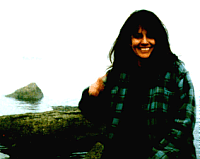
|
|---|
Resident Artist |
PMcM:I was born here in the West Country, actually on the Somerset Levels which is a vast flat wetland area punctuated only by what appears to be an amputated tit, a hillside called Glastonbury Tor, today "the last outpost of the hippy revolution". I moved to Wiltshire when I was a teenager in 1968 and I now live not far away from Stonehenge, so I kind of migrated from one mystical spot to another you could say. Living in the countryside suits me, and it was my surroundings which first inspired me to write. Even as a kid I was always writing, I'd be told to do essays at school and I'd end up writing a five chapter story or a play or something just because I'd get so carried away by it all. I became totally immersed in the work of the American writer Richard Brautigan early on and stupidly thought I'd be able to earn myself a living as a minor poet or something when I left school, although of course it never works like that.
WG: What were your first memories of digging rock music?
PMcM: Actually, that's quite a curious story. Most people seem to get into it through an elder brother or sister or through their friends, but I haven't got any brothers or sisters and living in the middle of nowhere I didn't really have many friends I could hang out with. It was actually my grandfather who first turned me on to underground music - he was interested in classical music, and when he heard me once complaining about how I didn't like pop music that much he said, "well, haven't you thought that just as there's popular classical music like 'The Planets Suite' and real classical music, the stuff I like, there mightn't be some other sort of pop music as well?" And that set me thinking. I mean, what if he was right? What if there was someone out there doing something experimental with a guitar and some drums and not just singing along to a pretty tune? I had no way of finding out, I mean there would be some cool things happening on the radio late at night but I was only eleven or twelve years old so I wasn't even aware of it.
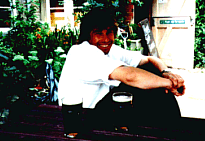
|
|---|
Phil McMullen practicing for |
...There was a girl at our village school though who had an uncle who played in a band who nobody had ever heard of: his name was Ray Williams and he was in a Welsh group called Man, so I filed that one away in my memory banks and a few months later when I hooked up with a kid at another school who did have an older sister who was into 'it' (she lived in a commune and had a boyfriend who was a roadie for someone called Led Zeppelin [ed.- Led who?]) and who seemed to know all about underground music - he had a massive collection of something like twenty albums - I mentioned that I liked the Man band and we instantly became friends. The fact that I'd never heard anything by them until then I carefully kept a secret! Of course, the moment I heard 'Two Ounces Of Plastic' I was totally in love. Anyway, the whole thing exploded from there on: I read somewhere that Man were influenced by Quicksilver and other West Coast American bands so I started buying every record I could by them, that led me towards blues and folk and... well, that enthusiasm for finding one new band through listening to another band has never really left me to this day.
WG: How did you start writing about music?
PMcM: That was indirectly down to the Man band as well. As I said, I left school wanting to be a writer and soon found it was impossible to get anything published, so I got myself an office job instead to support my already heavy vinyl habit and just wrote short stories and stuff for the hell of it. One of my friends got himself a job in London and found himself sitting opposite a guy wearing a Man band badge, so he said "hey, I know someone else who likes them..." It turned out that this guy was just starting up a fanzine and one of his first interviews was with Deke Leonard of Man, so he called me and invited me along. That was Nigel Cross and the magazine was to be called the Bucketfull of Brains; we found we had a lot in common in terms of musical taste and for some reason he seemed to like my writing style, so I was roped in to help. Suddenly I found I could combine my two first loves, music and writing, and even get my work published which of course was very exciting.
WG: We all know that you can't make a living on this so WHAT IS IT YOU REALLY DO?
PMcM: I'm "something in computers" as they say - involved in a thing called EDI, which is basically paperless trading, the computer to computer transfer of orders and invoices and stuff. It pays enough to keep a roof over our head, and I get enough pocket money out of it as well to maintain a still particularly heavy vinyl habit. I do tend to spend a lot on records, and that's mainly because I feel it's vitally important for the Terrascope not just to simply rely on the material that gets sent in by record companies. If you do that you end up looking like every other magazine, because you're all getting the same records sent to you and you're all writing about them. As well as reading other magazines and talking to their writers, I rely a lot on certain readers whose taste I know and trust to keep me informed about interesting new releases, plus of course I buy a lot from mail-order lists.
WG: Does your family think you were nuts for doing this?
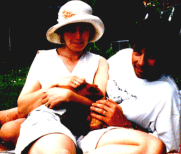
|
|---|
Phil & Heather |
PMcM: Probably, I never stopped to ask them. It's true to say that there would be no Terrascope without Lady Heather working so hard in the background. She runs all the accounts and spends hours every week at the bank and the post office. Whenever a new issue comes out we all get involved - the kids (Tom and Emily Grace) spend hours stuffing magazines into envelopes and licking 'Air Mail' stickers or whatever. Although I spend a lot of time working on the Terrascope at home, at least I'm always there for her to talk to. It's not as if I'm away from the house a lot - the occasional Bevis Frond tour or trip to the States for festivals and shows are the exception rather than the rule, and I like to try to keep the weekends free to spend time with the family. I suppose I put about six hours a day into the magazine, which doesn't leave a lot of time for watching television and relaxing - but then I'd rather be writing and listening to music anyway. I somehow find time to also farm a small piece of land we have, go trout fishing and raise chickens - we've got about 15 now I think (they're hard to count as they keep moving around). We raise rare breeds of English fowl, all sorts of shapes, sizes and colours.
WG: The PT deals a lot with psychedelia inspired music. What do you think made this era of Rock music so worth revisiting for inspiration (for the bands) and just for the sheer enjoyment (for the listeners)?
PMcM: The question suggests that psychedelia belongs in a former era, and I beg to differ on that score [ed. -ouch! bad phrasing...guilty as charged] . It's every bit as valid now as it was in 1968 (which is the period I guess you're hinting at). Actually defining what "psychedelic music" is is a conundrum which has beaten far better minds than mine before now and will no doubt continue to do so, but what I personally look for in music - invention, excitement, fluency, originality, the unexpected, the inspired and the occasionally brilliant - seems sadly lacking from so many other genres. You don't get a traditional folk musician suddenly throwing a detuned pedal steel guitar recorded backwards into the mix too often for example, or a heavy metal band resorting to a phased harpsichord solo. I love stuff like that, it amuses the hell out of me and music which is usually termed, often disaparagingly, "psychedelic" tends to be full of it.
WG: What do you think is missing from todays music that you think was prevelant in 60's psychedelic music or any other musical period? Conversely, what do you think bands now have musically that those bands lacked.

|
|---|
The Late |
PMcM: There seems to be a certain sense of community missing from bands working in the indie/underground/psychedelic rock genres which was very much alive back then... you can sense it's still around in the folk and prog-rock circles, lots of little festivals happening and plenty of interaction between bands, labels and fans - but not so much amongst the latterday Keepers of the Psychedelic Flame. Which is one reason I wanted the Terrastock festivals to be a success, not just because it proves a point, that we haven't been totally off our heads writing about music which is at best considered a minority interest for the last ten years, but because shows like that really do help to create a sense of togetherness. They foster creativity and give impetus to undervalued effort, and I can't begin to explain how important that seems, to me at least. It's what the Terrascope has been about all along. Musically of course independent bands today have all the advantages of comparatively cheap recording technology and the freedom to experiment randomly, which was missing back in the 60s when you had little choice but to book time in a professional studio, do your thing and get out as quickly as possible before the money ran out. maybe I'm wrong - I've never been a musician myself so I'm probably the wrong person to ask.
WG: When you hear a band what is the one thing that just makes your ears prick up? Not just musically mind you but other aspects as well.
PmcM: That's a tough one to answer because for me it's very instinctive. I have an intuitive sense when I hear something new that tells me whether it belongs in the Terrascope or not, whether I want to ramble at length about it or even just mention it because I think our readers deserve to know it exists; maybe it has that one stellar moment in amongst an ocean of mediocrity which nevertheless elevates it above the run of the mill. Sometimes it's not even a whole song, it can just be thirty seconds of inspiration midway through a song - but even a drug which guarantees a thirty second high and nothing else at all can be worth doing, wouldn't you agree? The downside of all that is that every new issue of the magazine sees me cringing in a corner somewhere waiting for the finger to be pointed, waiting for someone to write in and say "I bought that album on your recommendation and it totally fucking sucks". I'm very paranoid. Sometimes I wonder why I even do it, put my whole reputation on the line like that every time I write a review - because we purposfully don't write about the same things as every other magazine does, we make a point of exploring new stuff all the time. It's a dangerous line to tread, but can be incredibly rewarding when an unheard of band you've championed for a while starts getting talked about in positive terms by other people whose opinion you respect. Does that answer your question? Probably not. I suspect the answer is buried amongst some of my other responses somewhere though.
Thanks, man. That was pretty cathartic.
You can find out more about der Terrascope by checking out their webpage....
The Ptolemaic TerrascopeBack to the T.O.C. for Interviews
Back der Worship Guitars Homepage
Send threatening mail to us here at: